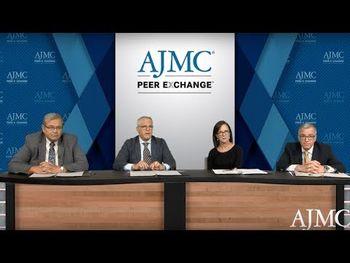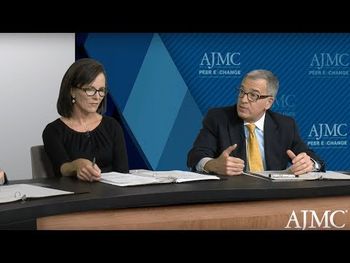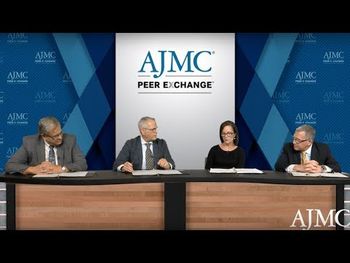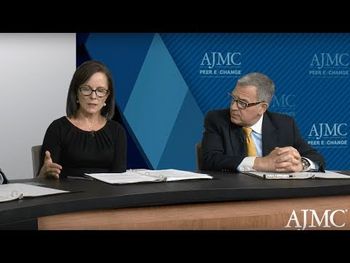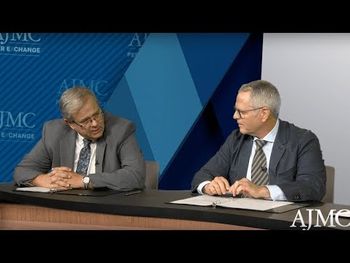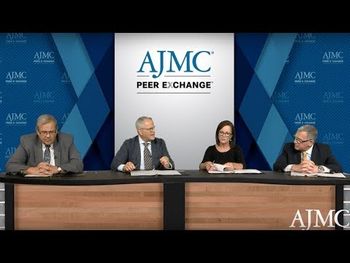
Oncology
Latest News
Latest Videos

CME Content
More News

The type of cancer a provider treats can determine how well he or she performs under the Oncology Care Model (OCM), according to research from Avalere Health that was presented at the American Society of Clinical Oncology Quality Care Symposium.

During a session at the North American Neuroendocrine Tumor Society annual meeting October 4-6 in Seattle, Washington, panelists discussed the benefits of integrative oncology and nutrition for patients with neuroendocrine tumors.

Somatostatin analogs have 2 roles in gastroenteropancreatic neuroendocrine tumors (GEP-NETS): treating symptoms related to the tumors and controlling tumor growth, explained Heloisa Soares, MD, assistant professor, University of New Mexico Cancer Center-Albuquerque.

An interim analysis of somatostatin analog lanreotide depot presented at the North American Neuroendocrine Tumor Society annual meeting, held October 4-6 in Seattle, Washington, found that the treatment was effective in disease control and most patients were satisfied with the treatment.

Two studies presented at the North American Neuroendocrine Tumor Society annual meeting October 4-6 in Seattle, Washington assessed different tools for determining quality of life among patients with neuroendocrine tumors (NETs).

This week, infectious disease specialists from different organizations are meeting in San Francisco for ID Week, an annual conference focused on many different infectious disease topics and their intersection with cancer, HIV, respiratory diseases, and more. Two abstracts presented results about what is needed to prevent complications in cancer care, one about patients with acute myeloid leukemia (AML) with prolonged neutropenia, and one examining the frequency of antimicrobial complications following initiation of palliative chemotherapy.

The Institute for Value-Based Medicine travels to New York City to learn how technology and trust are key to making the leap to two-sided risk.

The outpatient community oncology setting is consistently less costly for cancer treatment as opposed to the outpatient hospital setting.

Our study provides the first evidence on site-specific Medicare spending on chemotherapy adjusting for patient comorbid illnesses, cancer type, and other cancer-related risks.

A once-weekly dose of carfilzomib (Kyprolis) in combination with dexamethasone has been approved to treat patients with relapsed or refractory (R/R) multiple myeloma. The approved regimen improved progression-free survival and had a better overall response rate than a twice-weekly regimen.

Employers may not look forward to purchasing healthcare, but they are in the position to transform the market. More employers are getting more involved in healthcare by championing alternative payment models and other services to their employees.

A new study has found that people living with HIV are at an increased risk of both first and second primary cancer incidence.

A test that uses next-generation sequencing (NGS) has been approved to detect and monitor minimal residual disease in patients with multiple myeloma (MM) and B-cell acute lymphoblastic leukemia (ALL).

Here are the top 5 articles for the month of September.

Loyola University Chicago and Loyola Medicine announced plans this week to develop their own chimeric antigen receptor T-cells that would have less toxic side effects.

Earlier this week, 3 studies were released that investigated the financial difficulties seen in patients living with cancer. Such difficulties are referred to as “financial toxicity,” which was studied in patients with metastatic breast cancer and older patients, as well as the conversations about cost of care that women with breast cancer have with their physicians.

Earlier this week, drug manufacturer Astrazeneca announced the results from a phase 3 trial studying durvalumab (Imfinzi) among patients with stage III unresectable non­–small cell lung cancer (NSCLC) who did not have disease progression after concurrent chemoradiotherapy.
